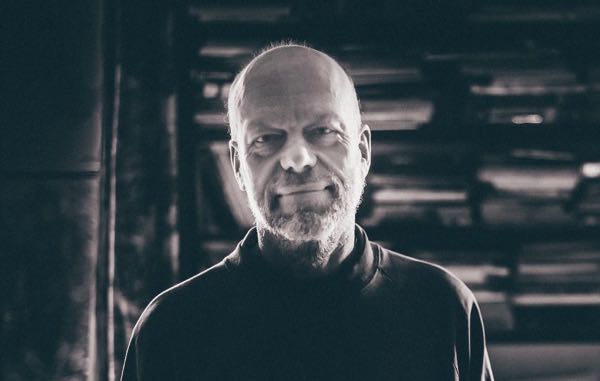 Mobile users tap and hold picture to share article.
Mobile users tap and hold picture to share article.
Interview with Dr. Richard Scott By Jeremy James
NOTE FROM JEREMY JAMES: Richard Scott is a family doctor in the city of Margate in the United Kingdom. Faith & Fitness Magazine asked me to speak with him and share his story because he brings his wellness vocation together with the Christian faith, which ultimately has an influence in culture. He actually prays with his clients, which is an amazing thing. He brings Jesus into the whole realm of the medical world. It is an example that all Christians active in fitness, wellness, sport or other aspects of physical life could learn and grow from.
PUBLISHER’S NOTE: Our interview with Dr. Scott is featured in our Faith and Fitness Culture department because he offers a very important and insightful narrative into how the Christian faith can be generously and graciously lived to bring a positive influence in human culture. Being faithful to God in vocation and through relationships with others is a reasonable calling, self-expectation, and human character quality that adds value, health and strength to all who experience it. Feature photo, library photo and beach photo Copyright Jeremy James. Used by permission.
Faith & Fitness Magazine: Why did you become a doctor?
Dr. Richard Scott: Thank you. I had an operation when I was fourteen. That was 1974. Around that time I was wondering whether to do biology at school. I woke up from this operation on my neck to see an absolutely gorgeous nurse and I thought that was the prod from God to say, “I want you to do biology rather than other subjects.” Maybe that’s what I needed to go into medicine. It sounds a bit corny. But God works in mysterious ways. I am delighted He did. I had just become a Christian at that point.
Faith & Fitness Magazine: So, why are you adding ‘prayer’ to your medical consultancy?
Dr. Richard Scott: Well I had become a Christian. I had walked away at twenty-six. I had come back and worked abroad as a doctor, as a medical missionary but never really shared my faith much. Even abroad as a surgeon operating on people, I was praying before operations, sharing my faith with staff but not really [with] patients.
I came back [at age] thirty-five and discovered Alpha. During week 7 I was sharing Alpha with other people. I suddenly realized that Nicky Gumbel was talking to ME.
WIKIPEDIA: Nicky Gumbel, is an English Anglican priest and author in the evangelical and charismatic traditions. He is known as the developer of the Alpha Course, a basic 10/11-week introduction to Christianity supported by churches of many Christian traditions.
So I made a decision. I did a pact with the Lord, “I will share my faith with patients, [those whom] I suspect it helps.” [Ultimately over the course of a] whole year I only spoke to two patients about the Lord. Not much happened but the sky didn’t cave in.
I was a Trainee GP (General Practitioner) Family Doctor at that stage. My pact with the Lord was this: put me in a Christian practice with other Christian doctors and I will really go for this.
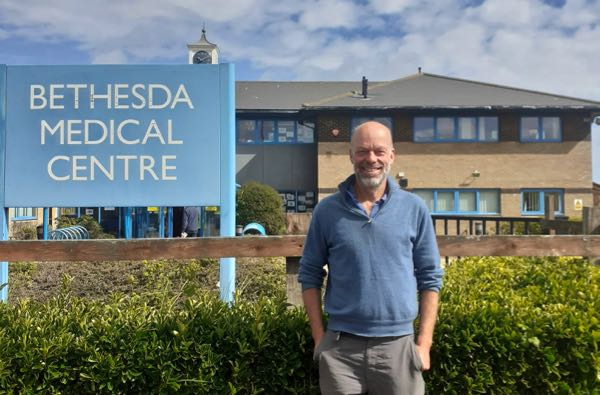
So, he moved me to Margate on the coast, which was another prayer answered and I began to [share]. Drug addicts often end up on the coast in very poor places. [So] all these drug addicts came in my room. I discovered they were coming out of prison. The government would give them £46 and they would meet somebody unsuitable who would help them to spend their £46 on drugs. They would run out of money, rob the local supermarket, get stoned, get pulled up by the police and go back to jail. This was their revolving circle.
It [occurred to me], “Alpha has helped me – I’ll offer them Alpha.” So I did and my well-meaning Christian medical colleagues said, “They won’t come. It’s a course for the middle class.”
I began to introduce these drug addicts to Alpha and some came. In fact, if you [were to] come to our church now, [you could meet] the lead guitarist a [former] heroine addict [who had] been to prison nine times until he discovered God through Alpha. No more prison; no more heroin.
[You could also meet] James, our second guitarist. I had to see him at home as a doctor. I had to climb over the cans of beer, through which he was working his way. Since he has come to Christ, alcohol has been kicked into touch. He worships the Lord and leads the rest of us.
I made a decision. I will share my faith.
I began to see that faith in God really changes lives. So I began to offer it to other people: the depressed, anxious, people with bitterness and people with anger, which is hugely common in our area. I offered it to the homeless and anyone with mental health problems in any way and I saw lives change.
Faith & Fitness Magazine: So it seems that by praying for people you come up against some obstacles. Why would you risk your career for prayer?
Dr. Richard Scott: I started as a General Practitioner, Family Doctor in 1998. Over the next twelve years I had maybe six or seven minor written complaints because not everybody, not every patient is happy to have God presented to them as an option in clinics.
So, say somebody comes with depression? I will always do the standard medical stuff first. Do they need antidepressants? Do they need counseling? Then I will offer something which I think is much more important than all of these, which is faith in God.
It is always an offer – people can turn it down. I had a few complaints over the years out of literally thousands of consultations involving God.
I knew that one day I might get a big complaint. Sure enough, in 2010 I got the mother and father of all complaints! I went before my main professional body called the General Medical Council. I took them on knowing that I would probably lose because I wanted to emphasize that doctors should be able to share their faith because it helps.
So, when I went to see them in their court, as it were, I brought two of my drug addicts with me. They weren’t allowed to speak but they were there backing up the hundreds of statements I had from patients that God had helped them in clinic.
I had seen much good [achieved] so I could take it on the chin knowing that not everybody would be delighted. [When] you read the gospels; many of the disciples were killed for their faith. Jesus was on a cross which was deliberate from his point of view, but also because it just reflected how not everybody will sign up to [embrace] Christianity.
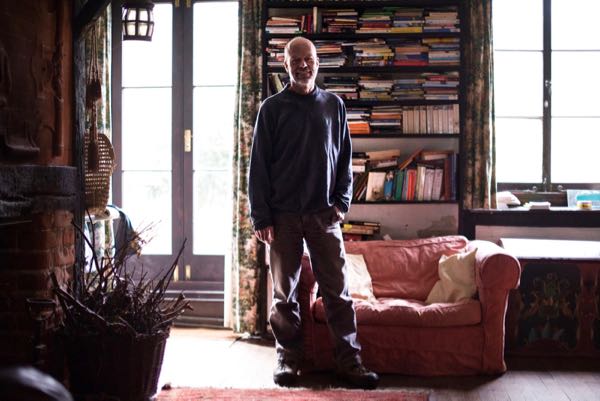
Faith & Fitness Magazine: Well done for that but if you were told, you cannot pray anymore with patients, what would you do?
Dr. Richard Scott: Well, first of all, I wasn’t told that. The General Medical Council warned me in 2010 that, if I had another spiritual complaint reaching them in the next 5 years then I would be in real trouble, probably lose my job. I just gave that to the Lord, you know, the Lord can cope with that.
If someone said to me, you can’t pray, I will pray anyway. Ultimately what doctors and other Christians have to know is who the boss. I ask them, “When we get to the Pearly Gates, who opens the door?” It’s not the General Medical Council, the General, the Nursing and Midwifery Council, the OFSTED for schools [or anyone else]. It is Jesus.
We shouldn’t have fear of man. The Bible makes that clear, do not fear man, only Him who has power over our souls – God himself. So, if somebody said to me, you cannot pray, well I’m afraid that is not in line with the Gospels. Whilst we try to remain in the law, so to speak, we can only do that if it is in line with God’s word.
Faith & Fitness Magazine: Fantastic! Can I ask, can you give testimony of praying with people and how much healing and prayers you have seen answered?
Dr. Richard Scott: Absolutely. I have had a whole range of prayers answered. I can give you some financial ones. I remember when I first discovered the power of supernatural prayer. I came back from Africa, working in Tanzania, running mission hospitals in 1995. I had said to the Tanzanian looking after the hospital, whatever you do, don’t order drugs from England; order it through me, I will look at your bank account and, you know, as long as we have money in the account you can have your medicines. Within a month everything goes wrong. He orders drugs straight from England and I get a £4,200 bill.
At that point, my wife is about to have our third baby, so she’s not working. I’m living with my father-in-law who is dying of cancer. Suddenly I get this bill, which I cannot pay. I thought oh my, this is a real problem. So I sat down with my wife Heather and prayed, “Lord help us, [with this need for] £4,200.” Two days later, having not mentioned it to anybody, I got a check in the post from some Monks I didn’t know for the full £4,200! I thought, “That is a supernatural result of prayer. That is very exciting!” I’ve seen God work in terms of money and I’ve seen God work in terms of patients.
I had a patient come to see me and she was desperate. Her whole-life had fallen apart. Her husband had died. Her parents had disowned her. She was owed seventeen months of benefits and was about to go to court the next week. I said, okay; let’s pray for this. Two weeks later she told me, “I got everything I asked for. ”
This is WHY we pray; it absolutely changes lives.
I’ve also seen patients not go to prison through prayer. Drug addicts who were about to go to court for steeling. I prayed out of God’s mercy they would get a community sentence, rather than being incarcerated; both of them were. That led them to at least some knowledge that God is powerful.
I have seen prayers for healing answered. I could tell you loads but I will give you just one. A friend of mine in my church, a District Nurse went to see a patient – an old lady who was blind. The lady wouldn’t let her in the door. So, all my nurse friend could do was ask, “Can I pray for you?” She said, “Yes, I would like you to pray that I can see enough to get my affairs in order before I die.”
Six weeks later my nurse friend returned to see this lady. When she got to the house gate she looked up and there was the lady reading a book on her porch. My friend took her to see an ophthalmologist, who said, “this lady was blind but now she can see and I have had no part to play in this”. I have come across many, many, many, healings over the years as a result of prayer.
Faith & Fitness Magazine: That’s great.
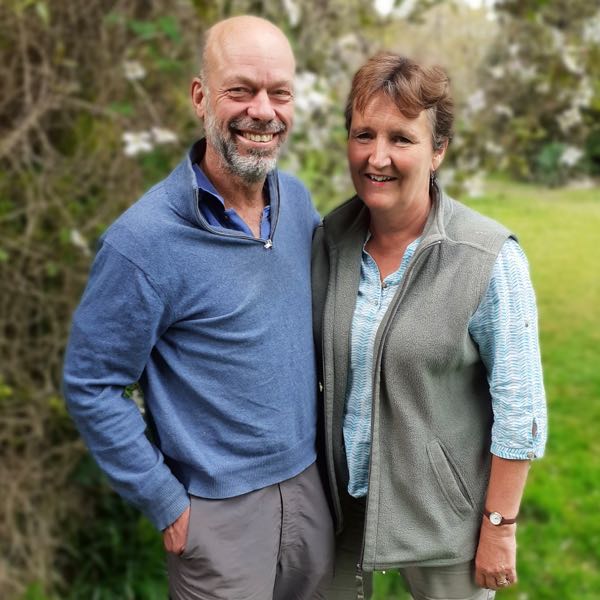 Dr. Richard Scott: My wife prays for infertile couples. She has seen at least four rapidly become pregnant when infertility treatment wasn’t working. She also has a particular ministry with those who have lung cancer. This type of cancer usually kills people rapidly. She prayed with a lady on treatment and the lung cancer has shrunk. This is what we see and it’s absolutely fantastic.
Dr. Richard Scott: My wife prays for infertile couples. She has seen at least four rapidly become pregnant when infertility treatment wasn’t working. She also has a particular ministry with those who have lung cancer. This type of cancer usually kills people rapidly. She prayed with a lady on treatment and the lung cancer has shrunk. This is what we see and it’s absolutely fantastic.
Faith & Fitness Magazine: What do you tell people who ask why we should pray?
Dr. Richard Scott: Let me share this example. I had a lady I prayed for last year. She had a terrible scan result. She had, what seemed to be malignant cancer throughout her body and her biggest fear was that her ex-husband would get her children when she died. That was her biggest fear.
I said to her when I got the result, “Bring your best friend.” I said, look, this result looks like it is cancer everywhere but if you agree, I will pray this isn’t cancer. It looks like cancer but I am going to pray this is not cancer.
So I prayed. She had her spleen out; she had bone biopsies. All the experts were sure it was cancer but they couldn’t find cancer anywhere. It came up with a very unusual diagnosis of benign vascular tumors throughout her body. There are only 50 cases of this worldwide known to man.
Now, I didn’t ask for this lady to be cured; I simply asked that it wouldn’t be cancer and she was delighted – that is how it turned out to be.
This is WHY we pray; it absolutely changes lives.
Faith & Fitness Magazine: Earlier we discussed what led to a BBC report in 2011 that you were warned for having faith discussions. More recently in 2020 The Guardian reported that there was “fresh scrutiny” over you initiating conversations. Share more about that.
Dr. Richard Scott: So I ran into trouble recently with the General Medical Council again in January 2020, after I did an interview on Radio 4 on behalf of Christian Concern, Christian Lawyers who support people like myself who run into trouble for their faith. I talked about how I prayed for patients and brought in Jesus into consultations. The National Secular Society in England and Wales complained. It came to the General Medical Council who has given me a lot of grief since then. But, what they failed to properly consider is the good that prayer does. Prayer changes lives. Not everybody likes it and that is up to him or her. But the fact is that patients are desperate.
People say, “I’m desperate”. Without being rude I ask, “You have no idea what to do, do you? That is why you have come to see me.” They say, “I have got no idea; I need help.” From there we proceed. Medicine does not have all the answers; it can help. Tablets can help and counseling can help but Jesus has all the answers.
I had a patient come to see me and said, “I’m like a sheep without a shepherd.” If that is not an entree to the gospel, I don’t know what is! As a Christian if I do not offer Jesus, what am I doing? What are we doing?
Of course, there are places for medicines. I have had ten operations myself for cancer and other operations on my body. I’m very grateful for medicine and surgery. But Jesus changes lives. Operations don’t transform our hearts.
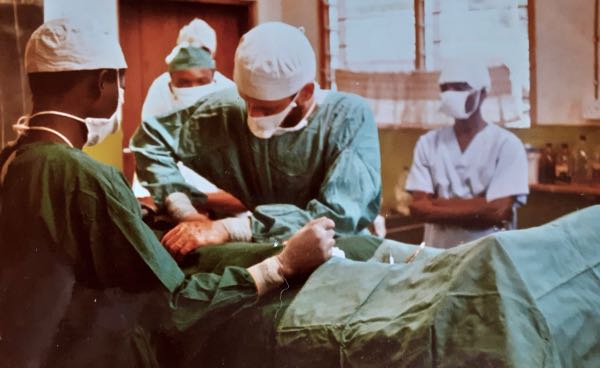
Faith & Fitness Magazine: How would you encourage other health care and wellness professionals like personal trainers or nutritionists to pray for their clients?
Dr. Richard Scott: Yes, absolutely every Christian professional can do this: personal trainers, doctors, nurses, students, occupational therapists, physios, whoever you are share your faith because it is the most precious thing we have.
I learned that as a medical missionary traveling abroad. I used to think that the most important thing was keeping the body alive. I was a surgeon. I operated on people and did my best. I realized that as a doctor, I might be able to keep someone alive until they are 100 by managing their blood sugar, cholesterol, blood pressure and more. I’d be identified as a really good doctor. But, if that person doesn’t know Jesus, dies and goes to hell; that is a bad result not a good result In fact that it’s a disaster.
For Christian it’s not good enough to only achieve physical outcomes, maintain professional soundness and success and justify our salary. We need to share our faith otherwise people die without Jesus.
Faith & Fitness Magazine: How could the church better help the health care of people by using faith as a preventative measure?
Dr. Richard Scott: Anxiety and depression are common conditions that doctors, wellness providers and churches all regularly address. Most people even Christians assume that the answer to these rather complex conditions are primarily medical. You know, do you need counseling? Do you need antidepressants? Certainly these things can help. But the Bible counsels us to not be anxious about anything but instead talk with God and listen to Him. Though that we gain the greater peace we need that can’t be achieved through medicine or human wisdom.
Instead of worrying, pray. Keep to the script, and God, who makes everything work together, will work you into his most excellent harmonies. –Bible
What I’m saying is that people need to realize that all of life including the biggest issues we have need to be laid at the foot of the cross and given with anticipation to God. Jesus has the answers! The church (every Christian) should be teaching people to give their problems to God first.
We are not saying that doctors, counselors and physical therapists can’t help; of course they can. But don’t forget to bring your stuff to God first. Often we use God as a last resort; that is daft. We should be going to Him daily as part of our lifestyle routine and certainly as a first preventative measure in our own health care. He might well say to us, yes, go see your doctor.
Let me better illustrate this for you. An evangelist friend of mine developed diabetes needing insulin treatment. He thought, “Well, I am a Christian, I don’t need to take my medicines.” He stopped taking insulin and six weeks later ended up in intensive care. As he was recovering God said to him, “Listen, take your insulin and I will look after you. I haven’t told you, I will heal you from diabetes. I will use doctors to keep you alive, but I will look after you in other ways.” He then lived for many more years, sharing faith and doing the wonderful work of an evangelist.
God didn’t say; stop your medicines in that particular case. He does for other people. He can heal them completely as Jesus did with leprosy. [However] In many instances God uses doctors to help. All healing comes from God including through doctors or physical therapists, physiotherapists, personal trainers and more.
Faith & Fitness Magazine: No that is a miracle.
Dr. Richard Scott: That is supernatural.
Faith & Fitness Magazine: Beyond healing (the care and treatment) should the church teach more about health and fitness – “prevention”? How can Christians help people to better care for the body God has given to them?
Dr. Richard Scott: Yes, Paul in the Bible says there is some value to physical fitness. He goes on to say that the most important thing is our spiritual fitness. But, he isn’t saying there is no value to practicing good physical fitness. Our body is the physical dwelling place of our spirit. When we neglect or abuse our body, then our spirit may not fully tap into the miraculous grace and glory of God’s spirit. So I think the church (everyone who identifies as a Christian) should absolutely (with a faith-centered perspective) teach more, on self-care, physically, mentally, as well as spiritually.
A TRANSFORMATIVE PERSPECTIVE
 Jeremy James conducted this interview with Dr. Richard Scott for Faith & Fitness Magazine. He, like a growing number of people throughout the world represents a transformative perspective that defines the faith and fitness culture. This perspective corrects the recipe from “faith-based” – ‘fitness with some faith added for flavor’ to “faith-centered” – ‘faith is the key ingredient of fitness’.
Jeremy James conducted this interview with Dr. Richard Scott for Faith & Fitness Magazine. He, like a growing number of people throughout the world represents a transformative perspective that defines the faith and fitness culture. This perspective corrects the recipe from “faith-based” – ‘fitness with some faith added for flavor’ to “faith-centered” – ‘faith is the key ingredient of fitness’.
Jeremy explains: For me, I began a transformative process from a self-destructive lifestyle many years ago, which was based around the Bible instruction of Romans chapter 12 verse 2 which talks about the transformation of the mind.
This meant a challenging time of gradually letting go of my old self so Jesus can move in and teach me how to become whole and get my heart to Him.
Having faith, knowledge of God’s Word and learning health and fitness was key to making a lifestyle change, with the best medication being God’s Holy Spirit and His Church.
I believe God can use all our journeys, to further His Kingdom, as we begin to walk in the nature of His Love for others to connect with.
Faith & Fitness Magazine: For many people when it comes to healthcare the preventative thing is not really happening for them. Do you think there is a way a transformative mindset can be better shared through medical teams, hospitals and things?
Dr. Richard Scott: I think so but I would start earlier in schools. I think we need to have better health education in schools. Of course, I would love for there to be a spiritual perspective shared but that might be difficult in schools nowadays. But the fact is we should certainly be starting in schools so that people are more informed.
As a doctor I don’t neglect standard Western medicine. I offer an extra beyond that with the spiritual care and it is allowed within what I do. The General Medical Council says that doctors shouldn’t share their faith unless the patient has previously indicated a desire to do so. But of course a patient can’t indicate a desire unless you offer it to them.
This [spiritual care] is always an offer. Say you come to me and you have recurrent tonsillitis. I might say, “My advice would that in addition to antibiotics, I think you should have your tonsils removed.” If the patient says, “I don’t want surgery”, that is fine – that is his or her decision. It’s the same with offering faith.
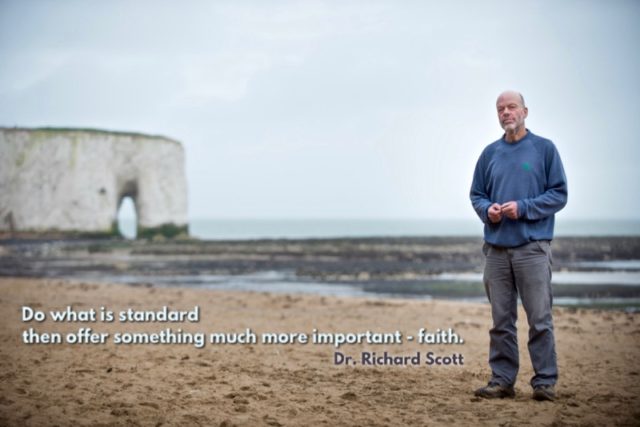
My experience is that most people would say, “Yes, what is it you have to offer? I want to know?” Most people are very open. They are open to prayer also. It is rare that a person turns down prayer.
The General Medical Council, my bosses, allows those conversations to take place. They don’t always follow their own rules, but they reflect the World Health Organization years ago, which said that full wellbeing is mental, physical and spiritual.
Questions for group discussion and personal reflection:
1. Dr. Scott shares how, “I went before my main professional body called the General Medical Council” to respond to a complaint and “emphasize that doctors should be able to share their faith because it helps”. Who do you know in your community (professional or otherwise) who has been questioned about offering faith to others? What were the outcomes and impact? What do you think would be necessary for this to happen to you? What attitude and understanding would you need to have to respond with a vision for opportunity rather than a risky defense to a threat?
2. What do you think or know are some of the spiritual needs of people where you live? How are they getting those needs met? What are some practical actions or solutions that could help? What is the scope and limits of pragmatic treatments? What spiritually focused care can you offer and what could be the results of such care?
3. How does this conversation shape your perspective on what defines and characterizes the “faith and fitness culture”? What makes others-mindedness such a key component of practicing intentional leadership among others? How can Doctor Scott’s story be applied to personal trainers, gym owners, nutritionist, and other fitness professionals? In your own words explain how offering prayer to others is a way you can be fit and strong in your community and be like Christ.
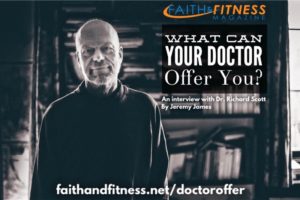
Use the above graphic to post into your social media and share this with your friends and contacts. CONTACT US for help in organizing an online conversation via Facebook LIVE or Zoom so that you can help strengthen leadership and culture in your community. Post a Facebook COMMENT immediately below and share your thoughts and perspectives with others on this topic.


